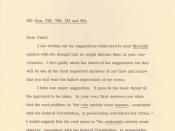"Good people do not need laws to tell them to act responsibly, while bad people will find a way around the laws."
- Plato
The Miranda rule, which makes a confession inadmissible in a criminal trial if the accused was not properly advised of his rights, has been so thoroughly integrated into the justice system that any person who watches television can recite the words: "You have the right to remain silent. Anything you say can and will be used against you in a court of law". Yet the 1966 Supreme Court ruling in Miranda vs. Arizona remains the subject of debate, and has had a great impact on law enforcement in the U.S.
On March 13, 1963, eight dollars in cash was stolen from a Phoenix, Arizona bank worker. Eleven days earlier, in Phoenix, Arizona, an 18-year-old mentally disturbed woman was kidnapped and raped. Police detained Ernesto Miranda, a 23-year-old man, for committing the theft but did not have a suspect in the rape case.
Ernesto Miranda was questioned on the theft charge, without being offered an attorney. During questioning, he confessed not only to the theft, but also to kidnapping and raping an eighteen-year-old woman eleven days earlier. He was subsequently arrested, convicted of kidnapping and rape and sentenced to twenty years in prison.
However, when Miranda was arrested he was not advised of his rights as they are declared in the Fifth Amendment. "According to the Fifth Amendment, no person shall be held to answer for a capital, or otherwise infamous crime, unless on a presentment or indictment of a grand jury, except in cases arising in the land or naval forces, or in the militia, when in actual service in time of war or public danger; nor shall any person be subject for the same...


